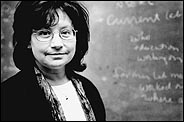Signing on
| Parents struggling to learn a second language have long suspected that kids pick it up with comparative ease. In fact, the younger one learns a language, the better — and that applies to sign language as well, according to Professor Rachel Mayberry, director of the School of Communication Sciences and Disorders.
 Professor Rachel Mayberry
Professor Rachel Mayberry
PHOTO: CLAUDIO CALLIGARIS | |
Mayberry's research is with adults who were born profoundly deaf, who, unlike their hearing counterparts, learned their first language at older ages.
"We are interested in whether the mind processes sign language the same way it does spoken language. We know that there is a critical period for speech — how well you speak a language depends largely on how old you are when you first learn it. So we test deaf people in our lab who learned sign language at various ages — from birth to age eight."
The critical period for language learning is one of rapid brain development.
"In brain development, there is an early period of exuberant growth. The brain's processing of the early stimulation from the environment is setting up neural circuits for specific tasks. If it doesn't have experience with certain kinds of signals and stimuli, then it won't create the appropriate neural circuits to process that kind of information."
Mayberry and her team of graduate students — some deaf, some hearing — found that the age of learning of sign language has a far greater effect on the outcome of learning a first language compared to learning a second one, even in the case of sign language.
"We discovered that the age constraints on spoken language also apply to sign language.
"Tests on our deaf subjects show that the older they were when they learned how to sign as a first language, the more their fluency drops; they don't understand as well, and don't remember as well. That shows that the brain, when [processing] sign language, treats it very much like spoken language."
But Mayberry also discovered an important distinction: while hearing children are exposed to language long before beginning to speak, children born deaf may suffer from a lack of language stimuli.
"People learning a second language have a native tongue which they learned first, but a significant number of deaf children don't get any language input before learning how to sign. The brain needs to be exposed to language from birth; when it is, people acquire the ability to learn languages throughout life.
"They have robust language skills, including reading and writing, as well as speaking. But deaf people who are only exposed to language later in life develop permanent language impairments; they may be unable to understand sign, and be unable to read or write."
Mayberry's tests on people who became deaf later in life confirm that the brain makes little distinction, when it comes to the abilities acquired, between sign and spoken language.
"We found that people who became deaf later in life understood sign language better than many of those who were born deaf. On the face of it, this doesn't make any sense, because those who are born deaf used sign language much longer.
"But, again, that critical period came into play; the person who became deaf had a native language. When they became deaf, they didn't lose the native language skills they acquired from birth which enabled them to acquire sign as a second language."
Unfortunately, deafness in a child is too often only diagnosed at age two or three.
"Parents usually only consider having their child tested when they haven't spoken by age one or two. Then, in Quebec, there is a waiting list to get a hearing test. Even after diagnosis, it could be another six months before the child has access to some kind of educational services.
"It can take a long time for the medical and rehabilitation systems to kick in."
Mayberry hopes that the results of her research encourage the government to establish deafness screening programs for infants.
"There is a move under way in the United States to establish universal infant hearing screening for newborns. Our research suggests that waiting to see whether or not your child will learn to speak is absolutely the wrong approach. We know the consequences of impoverished and late language input, so the wait-and-see approach is a mistake."
Mayberry is just back at McGill having recently discussed her work at a presentation at the annual meeting of the American Association for the Advancement of Science. Her graduate students and co-researchers are Charlene Chamberlain, Patrick Boudreault, Patricia Viens, Pam Withcer and Andrea MacLeod.
The work was funded by the Natural Sciences and Engineering Research Council.

